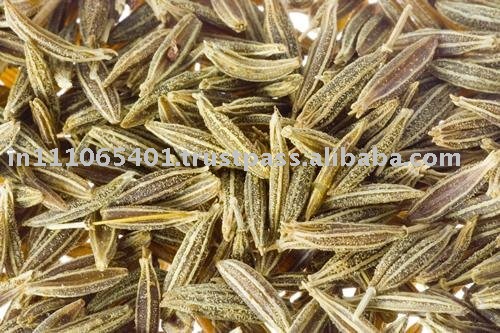
|

Cumin is an annual herb that grows up to a height of 35 to 45 cm. It produces a stem with many branches which bear long,
Cumin Co2 Extract
Cumin is an annual herb that grows up to a height of 35 to 45 cm. It produces a stem with many branches which bear long, finely divided, deep green leaves and small flowers, white or rose in color. The plant has aromatic seed like fruit, commonly known as cumin seed. It is oval shaped, approximately 6 mm long and light yellowish-brown in color. It has a peculiar, strong and heavy odor. The dried seeds form as essential ingredient of curry powder.
CUMIN SEEDS consist of moisture 6.2 percent, protein 17.7 percent, fat 23.8 percent, crude fiber 9.1 percent, carbohydrates 35.5 percent and mineral matter 7.7 percent per 100 grams. Their mineral and vitamin contents are calcium, iron, phosphorous, potassium, thiamine, sodium, riboflavin, niacin, vitamin C and A.
Botanical Name- Cuminum cyminum
Indian Name- Jeera
Health Benefits of Cumin Seeds
Below are some of the medicinal properties of cumin seeds:
Cumin seeds are highly beneficial in digestive disorders like biliousness, morning sickness, indigestion, atonic dyspepsia, diarrhea, malabsorption syndrome, and flatulent colic. One teaspoon of cumin seeds is boiled in a glass of water and the decoction mixed with one teaspoon of fresh coriander leaf juice and a pinch of salt. This decoction can be taken twice daily after meals as a medicine for diarrhea.
Black cumin is useful in the treatment of pile. About 60 grams of the seeds, of which half should be roasted, should be ground together. Three grams of this flour should be taken with water.
Cumin is effective in relieving sleeplessness. A teaspoon of the fried powder of cumin seeds mixed with the pulp of a ripe banana can be taken at night to induce sleep.
Dilute cumin water is an antiseptic beverage and very useful in common cold and fevers. To prepare cumin water, a teaspoon of cumin is added to boiling water, which is allowed to simmer for a few seconds and set aside to cool. If the cold is associated with sore throat, a few small pieces of dry ginger should add to the water. It soothes throat irritation.
Cumin seeds mixed with Caraway seeds and black salt is useful in renal colic. About 20 grams of cumin seeds, 12 grams of caraways seeds and 6 grams of black salt are ground together and mixed with a little vinegar. This mixture can be taken in doses of 3 grams every hour till relief is obtained.
A decoction of cumin seeds mixed with milk and honey, taken once daily during the entire period of pregnancy helps the healthy development of the foetus, eases child birth and increases the secretion of breast milk.
Cumin seeds are useful in amnesia or dullness of memory. Three grams of black cumin seeds are mixed with 12 grams of pure honey and licked to get of in this condition.
Black cumin ground in water is applied as a paste over boils with beneficial results.
Uses of Cumin Seeds
Cumin seeds are extensively used in mixed spices and for flavoring curries, soups, sausages, bread and cakes.
Organic oils require processing without the addition of external material. Supercritical fluid extraction (SFE) using carbon dioxide (CO2) is a particularly suitable isolation method. A natural plant extract, free from chemical alterations brought about by heat and water, and without solvent residues and other artifacts can be obtained by this method. Carbon dioxide is non-toxic, non-explosive, readily available and easily removed from the extracted products.
Plant Part: Seeds
Extraction Method: Supercritical Fluid Extraction Process (SCFE) also called Co2 Extraction process.
Description: Cumin (Cuminum cyminum) is in the parsley family of essential oils. The oil is obtained through co2 extraction. Cumin is a small, delicate, annual herb more like a ground cover. It grows about 20 inches high and has slender stems, dark green feathery leaves and small pink or white flowers followed by small seeds.
Color: Clear to pale yellow
Cumin oil extracts are used for medicinal purposes and food flavouring. The properties include use as an antiseptic, anti toxic, anti-oxidant, antispasmodic, aphrodisiac, digestive, bactericidal, larvicidal, emmenagouge, diuretic in nature, a nervine and as a stimulant. Cumin essential oil is used as a warming oil to relieve muscular pains and in osteoarthritis. For the digestive system it is a stimulant that helps with colic, dyspepsia, flatulence, bloating and indigestion. Essential oil of Cumin is known to have a beneficial effect on migraine, headaches, and exhaustion. Cumin essential oil has anti-inflammatory property. It is an antiviral; aids digestion protects liver and stimulates immune system.
Consistency: Light to Medium
Note: Middle
Strength of Aroma: Medium
Cumin Oil mixes well with: Lavender, Rosemary, Chamomile, Angelica, Caraway, and other essential oils.
Precaution: Cumin has phototoxic properties and after application direct sunlight should be avoided. Also pregnant women and people with sensitive skin should avoid it.
Background : This is a traditional Middle Eastern spice used in making curries. It is vastly used in Ayurvedic medicines, as a stimulant and for digestive complaints like indigestion.
| Place of Origin: Maharashtra India | Type: Flavoring Agents | Brand Name: ENJAY |